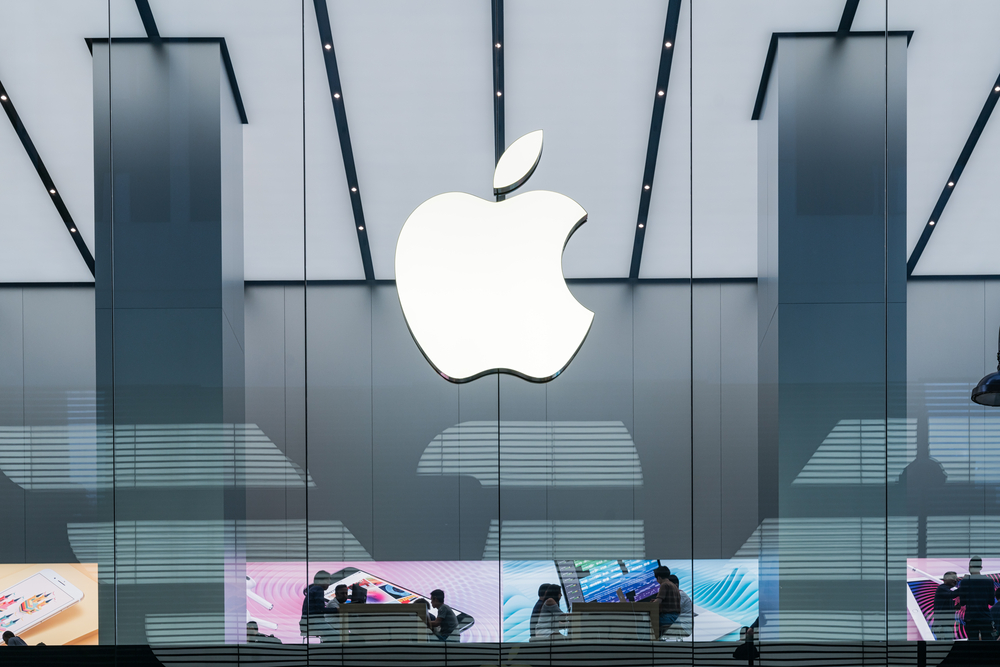Apple revealed today its most ambitious financial commitment to date, planning to funnel over $500 billion into the U.S. economy during the next four years. This historical investment will expand operations in Michigan, Texas, California, Arizona, Nevada, Iowa, Oregon, North Carolina, and Washington, strengthening Apple’s already substantial American footprint.
The crown jewel of corporate American investment
The California-based technology leader has committed to what appears to be one of the largest corporate investment plans in U.S. history, continuing its long tradition of backing American innovation and high-skilled manufacturing. The comprehensive strategy targets artificial intelligence development, silicon engineering advancement, and nationwide skills expansion.
“We are bullish on the future of American innovation, and we’re proud to build on our long-standing U.S. investments with this $500 billion commitment to our country’s future,” said Tim Cook, Apple’s CEO. “From doubling our Advanced Manufacturing Fund, to building advanced technology in Texas, we’re thrilled to expand our support for American manufacturing.”
The investment package encompasses Apple’s collaboration with thousands of suppliers across all 50 states, direct employment opportunities, infrastructure for Apple Intelligence, data centers, corporate facilities, and Apple TV+ productions spanning 20 states. The company remains among America’s largest taxpayers, having contributed more than $75 billion to U.S. tax coffers over the past five years, including $19 billion in 2024 alone.
Currently, Apple supports over 2.9 million jobs throughout the country through direct employment, partnerships with American suppliers and manufacturers, and developer positions within the iOS app economy. This new commitment aims to significantly expand that economic impact.
The 4 major components of Apple’s investment strategy
1. New manufacturing facility in Houston
A centerpiece of Apple’s U.S. investment involves partnering with manufacturing companies to begin producing servers in Houston later this year. The initiative includes constructing a 250,000-square-foot server manufacturing facility scheduled to open in 2026, generating thousands of new jobs in the region.
These servers, previously manufactured outside the United States, play a critical role in powering Apple Intelligence, the company’s personal intelligence system. They form the foundation of Private Cloud Compute, which combines powerful AI processing capabilities with advanced security architecture for AI cloud computing.
Apple engineers designed these servers with energy efficiency as a priority, reducing power demands at Apple data centers—which already operate on 100 percent renewable energy. As the company expands Apple Intelligence services to customers across America, it plans to increase data center capacity in North Carolina, Iowa, Oregon, Arizona, and Nevada.
2. Doubling the U.S. Advanced Manufacturing Fund
Apple will increase its U.S. Advanced Manufacturing Fund from $5 billion to $10 billion as part of this investment surge. Created in 2017, the fund supports innovation and high-skilled manufacturing positions throughout America, with a focus on promoting advanced manufacturing and skills development across the country.
This expansion includes a multibillion-dollar commitment from Apple to produce advanced silicon at TSMC’s Fab 21 facility in Arizona. As the facility’s largest customer, Apple supports more than 2,000 workers who manufacture chips in the United States. Mass production of Apple chips began at the Arizona facility last month.
Apple-designed silicon delivers exceptional features, performance, and power efficiency across the company’s devices. The company’s suppliers currently manufacture silicon in 24 factories spanning 12 states, including Arizona, Colorado, Oregon, and Utah. These investments help create thousands of high-paying positions at American companies like Broadcom, Texas Instruments, Skyworks, and Qorvo.
Since its inception, Apple’s U.S. Advanced Manufacturing Fund has supported projects in 13 states—including Kentucky, Pennsylvania, Texas, and Indiana—helping build local businesses, train workers, and create innovative manufacturing processes and materials for Apple products.
3. Expanding research and development nationwide
Apple continues to intensify its research and development activities across the United States. In the past five years, the company has nearly doubled its U.S.-based advanced R&D spending and plans to accelerate this growth further.
The tech giant recently introduced iPhone 16e to its smartphone lineup, featuring enhanced performance and battery life thanks to the A18 chip and the new Apple C1—the first cellular modem designed by Apple and the most power-efficient modem ever used in an iPhone. The Apple C1 represents a significant milestone in Apple silicon development, resulting from years of R&D investment and the collaborative efforts of thousands of engineers.
Over the next four years, Apple plans to hire approximately 20,000 people, with the vast majority focused on R&D, silicon engineering, software development, and artificial intelligence and machine learning. This expanded commitment includes substantial investment in Apple’s R&D hubs nationwide, with growing teams concentrated on custom silicon, hardware engineering, software development, artificial intelligence, and machine learning.
4. Creating a new Manufacturing Academy in Detroit
To help companies transition to advanced manufacturing methods, Apple will establish the Apple Manufacturing Academy in Detroit. Apple engineers, alongside experts from leading universities such as Michigan State, will consult with small and medium-sized businesses on implementing AI and smart manufacturing techniques.
The academy will offer free in-person and online courses, featuring a skills development curriculum that teaches workers essential skills like project management and manufacturing process optimization. These courses aim to enhance productivity, efficiency, and quality in companies’ supply chains.
Apple has demonstrated long-term commitment to education and skills development for American workers and students. This includes ongoing and expanding grant programs for organizations like 4-H, Boys & Girls Clubs of America, and FIRST, which collaborate with Apple in communities nationwide to create free programming that helps young people learn valuable skills such as coding.
The company’s support for future innovators also includes initiatives like Apple’s New Silicon Initiative, which prepares students for careers in hardware engineering and silicon chip design. Last year, this program expanded to students at Georgia Tech and now reaches students at eight schools across the country. Apple continues to grow the initiative, including a new collaboration with UCLA’s Center for Education of Microchip Designers (CEMiD) beginning this year.
Building on a history of American investment
This latest investment announcement builds upon Apple’s continuing tradition of substantial U.S. economic support. The technology giant has consistently invested in American facilities, jobs, and innovation throughout its corporate history.
Industry analysts note that Apple’s $500 billion commitment represents an unprecedented level of investment from a single corporation. The scale of this financial commitment exceeds the annual GDP of many countries and reflects Apple’s confidence in the American economy and workforce.
“This level of investment is transformative not just for the technology sector but for American manufacturing as a whole,” said economist Dr. Eleanor Ramirez, who specializes in corporate investment analysis. “We’re seeing a recommitment to domestic production that could reshape regional economies for decades to come.”
The manufacturing expansion in Houston is particularly noteworthy as it represents Apple bringing production of critical AI infrastructure back to American soil. The servers that will be manufactured at the new facility are essential components of Apple’s future AI strategy, highlighting the importance the company places on domestic production for its most innovative technologies.
Creating opportunities across the educational spectrum
Beyond direct manufacturing and research positions, Apple’s investment strategy includes significant educational components aimed at developing the next generation of American technology workers.
The Apple Manufacturing Academy in Detroit stands as a centerpiece of this educational initiative, offering both theoretical knowledge and practical skills training for workers transitioning to advanced manufacturing environments. By combining Apple’s technological expertise with academic partnerships, the academy aims to create a pipeline of qualified workers for the manufacturing jobs of tomorrow.
“The skills gap in advanced manufacturing is one of the most significant challenges facing American industry today,” noted Dr. James Wilson, manufacturing education specialist at Michigan State University. “The Apple Manufacturing Academy’s approach of combining direct industry experience with academic rigor addresses this gap in a meaningful way.”
Additionally, Apple’s New Silicon Initiative continues to expand its reach across American universities, preparing students for careers in the rapidly growing field of silicon design and manufacturing. The initiative provides specialized curriculum, equipment, and industry connections to help students transition directly into high-demand positions upon graduation.
The company’s support for youth-focused organizations like 4-H and Boys & Girls Clubs of America extends these educational benefits to younger Americans, providing early exposure to coding, design thinking, and technological problem-solving. These programs particularly target communities that have historically had limited access to technology education.
Economic ripple effects across the nation
The impact of Apple’s $500 billion investment extends beyond the company’s direct operations. Economic analyses suggest that such large-scale investment creates significant multiplier effects throughout regional economies.
In communities where Apple expands operations, local businesses typically see increased activity across sectors from hospitality to housing. The announced Houston manufacturing facility alone is expected to generate thousands of indirect jobs in addition to the direct manufacturing positions.
Supply chain businesses serving Apple’s expanding operations will likely experience growth opportunities as the tech giant increases its American sourcing. The company’s commitment to doubling its Advanced Manufacturing Fund indicates a strategic prioritization of domestic suppliers.
“Corporate investments of this magnitude have cascading economic benefits,” explained urban economist Patricia Rodriguez. “Beyond direct employment, we typically see increases in regional wage levels, property values, and entrepreneurial activity in areas receiving substantial corporate investment.”
Setting a new standard for corporate commitment
Apple’s announcement may encourage other major technology companies to increase their American investment. Industry observers note that the scale and comprehensive nature of Apple’s commitment establishes a new benchmark for corporate engagement with the U.S. economy.
The emphasis on manufacturing, research and development, and education addresses multiple economic priorities simultaneously, creating a holistic approach to corporate investment that extends beyond simple job creation or facility construction.
“Apple’s holistic investment approach reflects an understanding that economic development requires attention to the entire workforce pipeline,” noted corporate social responsibility researcher Dr. Michael Thompson. “From early education to advanced manufacturing training, they’re addressing multiple points in the talent development system.”
For regions receiving Apple investment, the benefits extend beyond immediate economic gains to include potential long-term transformation of local economic landscapes. Communities like Houston and Detroit may see lasting changes to their economic identities as they become more deeply integrated into advanced technology manufacturing.
As Apple moves forward with implementing this historic investment plan, both the company and the nation will be watching closely to see how these financial commitments translate into economic reality for American workers, businesses, and communities in the coming years.













